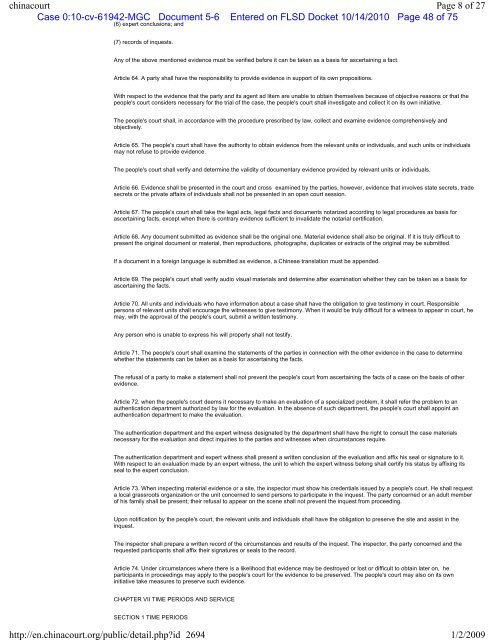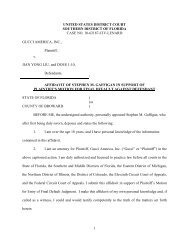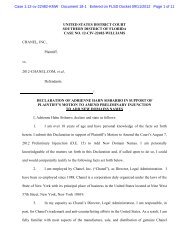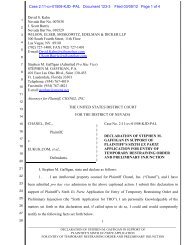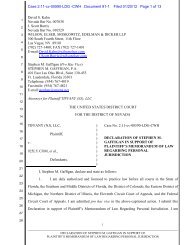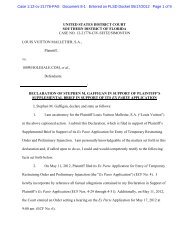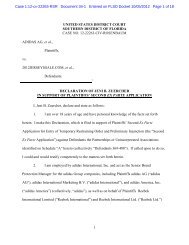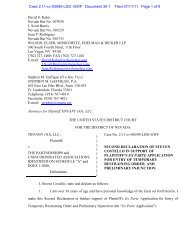UNITED STATES DISTRICT COURT SOUTHERN DISTRICT OF ...
UNITED STATES DISTRICT COURT SOUTHERN DISTRICT OF ...
UNITED STATES DISTRICT COURT SOUTHERN DISTRICT OF ...
You also want an ePaper? Increase the reach of your titles
YUMPU automatically turns print PDFs into web optimized ePapers that Google loves.
Case 0:10-cv-61942-MGC Document 5-6 Entered on FLSD Docket 10/14/2010 Page 48 of 75<br />
(6) expert conclusions; and<br />
(7) records of inquests.<br />
Any of the above mentioned evidence must be verified before it can be taken as a basis for ascertaining a fact.<br />
Article 64. A party shall have the responsibility to provide evidence in support of its own propositions.<br />
With respect to the evidence that the party and its agent ad litem are unable to obtain themselves because of objective reasons or that the<br />
people's court considers necessary for the trial of the case, the people's court shall investigate and collect it on its own initiative.<br />
The people's court shall, in accordance with the procedure prescribed by law, collect and examine evidence comprehensively and<br />
objectively.<br />
Article 65. The people's court shall have the authority to obtain evidence from the relevant units or individuals, and such units or individuals<br />
may not refuse to provide evidence.<br />
The people's court shall verify and determine the validity of documentary evidence provided by relevant units or individuals.<br />
Article 66. Evidence shall be presented in the court and cross examined by the parties, however, evidence that involves state secrets, trade<br />
secrets or the private affairs of individuals shall not be presented in an open court session.<br />
Article 67. The people's court shall take the legal acts, legal facts and documents notarized according to legal procedures as basis for<br />
ascertaining facts, except when there is contrary evidence sufficient to invalidate the notarial certification.<br />
Article 68. Any document submitted as evidence shall be the original one. Material evidence shall also be original. If it is truly difficult to<br />
present the original document or material, then reproductions, photographs, duplicates or extracts of the original may be submitted.<br />
If a document in a foreign language is submitted as evidence, a Chinese translation must be appended.<br />
Article 69. The people's court shall verify audio visual materials and determine after examination whether they can be taken as a basis for<br />
ascertaining the facts.<br />
Article 70. All units and individuals who have information about a case shall have the obligation to give testimony in court. Responsible<br />
persons of relevant units shall encourage the witnesses to give testimony. When it would be truly difficult for a witness to appear in court, he<br />
may, with the approval of the people's court, submit a written testimony.<br />
Any person who is unable to express his will properly shall not testify.<br />
Article 71. The people's court shall examine the statements of the parties in connection with the other evidence in the case to determine<br />
whether the statements can be taken as a basis for ascertaining the facts.<br />
The refusal of a party to make a statement shall not prevent the people's court from ascertaining the facts of a case on the basis of other<br />
evidence.<br />
Article 72. when the people's court deems it necessary to make an evaluation of a specialized problem, it shall refer the problem to an<br />
authentication department authorized by law for the evaluation. In the absence of such department, the people's court shall appoint an<br />
authentication department to make the evaluation.<br />
The authentication department and the expert witness designated by the department shall have the right to consult the case materials<br />
necessary for the evaluation and direct inquiries to the parties and witnesses when circumstances require.<br />
The authentication department and expert witness shall present a written conclusion of the evaluation and affix his seal or signature to it.<br />
With respect to an evaluation made by an expert witness, the unit to which the expert witness belong shall certify his status by affixing its<br />
seal to the expert conclusion.<br />
Article 73. When inspecting material evidence or a site, the inspector must show his credentials issued by a people's court. He shall request<br />
a local grassroots organization or the unit concerned to send persons to participate in the inquest. The party concerned or an adult member<br />
of his family shall be present; their refusal to appear on the scene shall not prevent the inquest from proceeding.<br />
Upon notification by the people's court, the relevant units and individuals shall have the obligation to preserve the site and assist in the<br />
inquest.<br />
The inspector shall prepare a written record of the circumstances and results of the inquest. The inspector, the party concerned and the<br />
requested participants shall affix their signatures or seals to the record.<br />
Article 74. Under circumstances where there is a likelihood that evidence may be destroyed or lost or difficult to obtain later on, he<br />
participants in proceedings may apply to the people's court for the evidence to be preserved. The people's court may also on its own<br />
initiative take measures to preserve such evidence.<br />
CHAPTER VII TIME PERIODS AND SERVICE<br />
SECTION 1 TIME PERIODS


